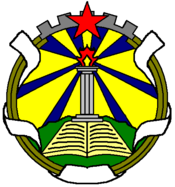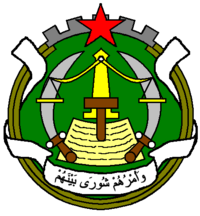Legislatures of Indokistan
| Federal State of Indokistan |
 This article is part of the series: |
|
|
|
Government basis
Executive
Legislative
Government Policy
Elections and Referendums
2011 |
Throughout the history of Indokistan from 2010 to 2016, the country's legislature evolved multiple times to fit with the national leaders' visions and national interests.
The first parliament was constituted as Farhangrad Parliament in March 2011, months after the establishment of Indokistan, when the executive government relinquished the legislation power. The Farhangrad Parliament was reconstituted as Bolshoiskii Parliament in October 2011 amid the De-Farhanisation policy. Apart from the name change, the parliament institution was virtually the same.
Indokistan had no legislature during the Emergency Government in August 2012 when the National Salvation Council assumed legislative power.
Quick succession of national legislatures due to instability during the Federal Republic and the Third Republic eras produced two short-lived legislatures of People's Council and the National Consensus, the latter being "quasi-legislature".
The National Forum of Indokistan, formed during the National Reform era, was formalised during the Federal State era in 5 July 2013. The Forum formed the core of Indokistani direct democracy system.
Pre-parliament era (2010)
Despite the national government being immediately constituted after the establishment of Indokistan in 16 September 2010, the founding fathers were neglectful about the importance of a legislature independent of the executives. Hence, during the First Republic era, the government hold legislation power.
Farhangrad Parliament (2011)
Farhangrad Parliament (Indonesian: Parlemen Farhangrad) was the first legislature of Indokistan established on March 2011 amid the maturing of national politics after the January Revolution and the entry to the MicroWiki community in February on the same year. The parliament was named after national founder Farhan Abbas during the peak of his personality cult.
The parliament was the only legislature in the history of Indokistan to be voted in a legislative election which took place on March 2011, despite the results was abrogated by President Farhan after it put the Islamic Party of Indokistan at a disadvantage. Political compromise achieved a near-balanced parliament, with National Party of Indokistan only able to maintain its plurality due to Mustafa Hakim's uncontested seat.
The parliament was disbanded during the De-Farhanisation in October 2011 solely due to its name.
Bolshoiskii Parliament (2011-2012)

Bolshoiskii Parliament (Indonesian: Parlemen Bolshoiskii) was the Indokistani legislature from October 2011 until August 2012 to replace the Farhangrad Parliament. Despite being constituted as a new legislature, the only difference with the previous parliament was on its nomenclature, due to the controversial De-Farhanisation policy.
The parliament was last convened in August 2012 when it was extra-constitutionally disbanded by the Emergency Government of Indokistan. Without regaining its legislative power, the parliament formally disbanded in March 2013 during the national reform.
People's Council (2012)
The People's Council (Indonesian: Dewan Rakyat) was the only bicameral legislature in the history of Indokistan. It was constituted during the short-lived Federal Republic of Indokistan in September 2012, and was disbanded in October 2012 following the establishment of the Indokistani Third Republic.
The council composed of the Republic Senate (Indonesian: Senat Republik) as the upper house representing constituent republics, and the National Senate (Indonesian: Senat Nasional) as the lower house representing Indokistani population.
The parliament never formally convened despite Tian Abdurrahman had been designated as Speaker and ex-officio member of the triumvirate Federal Council.
National Consensus (2012)
The National Consensus (Indonesian: Konsensus Nasional) was the quasi-legislative assembly of the Indokistani Third Republic founded in October 2012. Despite the government did not explicitly declared the assembly as the national legislature, it had law-making and decision-making powers on national interests and issues.
Intended to represent national and regional interests, membership of the council consists of elected members, president, chancellor, and mayor of cities.
The legislature was intended to be convened monthly, yet it was never been convened until the collapse of the Third Republic in December 2012.
National Forum (2013-2016)

The National Forum of lndokistan (Indonesian: Forum Nasional Indokistan), also known by its Indonesian short name Fornas, from Forum Nasional, was constituted as the legislature of Indokistan in early 2013 during the National Reform. The legislature was formalised by the Federal State of Indokistan upon its founding on 5 July 2013, and received constitutional status in January 2014.
The National Forum held the distinction of being the only Indokistani legislature founded by the direct democratic principle and was the core of Indokistani direct democracy. The president was the designated head of the National Forum, replicating Indonesia's consensus democracy and the decision-making process at the village level.